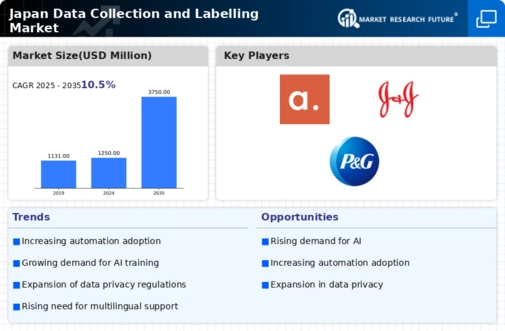Emergence of Specialized Labelling Services
The Japan data collection labelling market is experiencing the emergence of specialized labelling services tailored to specific sectors. Industries such as healthcare, automotive, and finance are increasingly requiring bespoke labelling solutions to address their unique data needs. For example, the healthcare sector demands precise labelling for medical imaging data to train diagnostic algorithms effectively. This specialization indicates a shift towards more nuanced labelling approaches, which could enhance the overall quality of datasets. As a result, the Japan data collection labelling market is likely to see a diversification of service offerings, catering to the distinct requirements of various industries, thereby fostering innovation and growth.
Expansion of E-commerce and Digital Services
The Japan data collection labelling market is significantly influenced by the rapid expansion of e-commerce and digital services. With the e-commerce sector projected to reach 20 trillion JPY by 2026, there is a pressing need for accurate data labelling to optimize customer experiences and improve service delivery. Companies are increasingly utilizing labelled data to analyze consumer behavior, enhance product recommendations, and streamline logistics. This trend indicates that the demand for data collection labelling services is likely to rise in tandem with the growth of digital platforms. Therefore, the Japan data collection labelling market stands to benefit from the burgeoning e-commerce landscape, as businesses seek to harness the power of data to gain a competitive edge.
Increased Focus on Data Quality and Accuracy
The Japan data collection labelling market is witnessing a heightened emphasis on data quality and accuracy. As organizations recognize the critical role that high-quality labelled data plays in the success of machine learning models, there is a growing demand for meticulous labelling processes. Companies are investing in advanced labelling technologies and skilled personnel to ensure that the data meets stringent quality standards. This focus on data integrity is likely to drive the growth of the Japan data collection labelling market, as businesses seek reliable solutions that can deliver precise and consistent results. The trend suggests that the market will continue to evolve, with an increasing number of players prioritizing quality assurance in their labelling services.
Rising Adoption of Machine Learning Technologies
The Japan data collection labelling market is experiencing a notable surge in the adoption of machine learning technologies across various sectors. As organizations increasingly rely on machine learning for data-driven decision-making, the demand for high-quality labelled data has escalated. In 2025, the market for machine learning in Japan was valued at approximately 1.5 billion USD, indicating a robust growth trajectory. This trend suggests that companies are prioritizing the acquisition of accurately labelled datasets to enhance the performance of their algorithms. Consequently, the Japan data collection labelling market is poised to benefit from this growing need, as businesses seek reliable partners to provide comprehensive labelling services that meet their specific requirements.
Government Initiatives Supporting Data Innovation
The Japan data collection labelling market is likely to gain momentum from various government initiatives aimed at fostering data innovation. The Japanese government has implemented policies to promote the use of big data and artificial intelligence, which inherently requires extensive data labelling. For instance, the 'Data Strategy 2025' initiative encourages businesses to leverage data for economic growth, thereby increasing the demand for labelled datasets. This governmental support not only enhances the credibility of the data collection labelling market but also stimulates investment in technology and infrastructure. As a result, the Japan data collection labelling market is expected to flourish, driven by these strategic initiatives that align with national economic goals.














